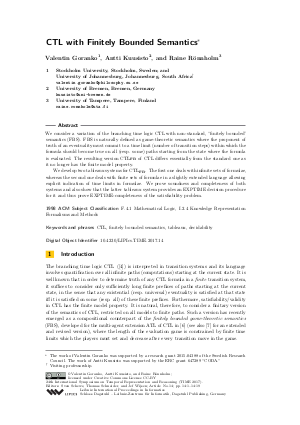CTL with Finitely Bounded Semantics
Authors Valentin Goranko, Antti Kuusisto, Raine Rönnholm
-
Part of:
Volume:
24th International Symposium on Temporal Representation and Reasoning (TIME 2017)
Part of: Series: Leibniz International Proceedings in Informatics (LIPIcs)
Part of: Conference: International Symposium on Temporal Representation and Reasoning (TIME) - License:
 Creative Commons Attribution 3.0 Unported license
Creative Commons Attribution 3.0 Unported license
- Publication Date: 2017-09-25
File

PDF
LIPIcs.TIME.2017.14.pdf
- Filesize: 0.64 MB
- 19 pages
Document Identifiers
Subject Classification
Keywords
- CTL
- finitely bounded semantics
- tableaux
- decidability
Metrics
- Access Statistics
-
Total Accesses (updated on a weekly basis)
0PDF Downloads0Metadata Views
Abstract
We consider a variation of the branching time logic CTL with non-standard, "finitely bounded" semantics (FBS). FBS is naturally defined as game-theoretic semantics where the proponent of truth of an eventuality must commit to a time limit (number of transition steps) within which the formula should become true on all (resp. some) paths starting from the state where the formula is evaluated. The resulting version CTL(FB) of CTL differs essentially from the standard one as it no longer has the finite model property. We develop two tableaux systems for CTL(FB). The first one deals with infinite sets of formulae, whereas the second one deals with finite sets of formulae in a slightly extended language allowing explicit indication of time limits in formulae. We prove soundness and completeness of both systems and also show that the latter tableaux system provides an EXPTIME decision procedure for it and thus prove EXPTIME-completeness of the satisfiability problem.
Cite As Get BibTex
Valentin Goranko, Antti Kuusisto, and Raine Rönnholm. CTL with Finitely Bounded Semantics. In 24th International Symposium on Temporal Representation and Reasoning (TIME 2017). Leibniz International Proceedings in Informatics (LIPIcs), Volume 90, pp. 14:1-14:19, Schloss Dagstuhl – Leibniz-Zentrum für Informatik (2017)
https://doi.org/10.4230/LIPIcs.TIME.2017.14
BibTex
@InProceedings{goranko_et_al:LIPIcs.TIME.2017.14,
author = {Goranko, Valentin and Kuusisto, Antti and R\"{o}nnholm, Raine},
title = {{CTL with Finitely Bounded Semantics}},
booktitle = {24th International Symposium on Temporal Representation and Reasoning (TIME 2017)},
pages = {14:1--14:19},
series = {Leibniz International Proceedings in Informatics (LIPIcs)},
ISBN = {978-3-95977-052-1},
ISSN = {1868-8969},
year = {2017},
volume = {90},
editor = {Schewe, Sven and Schneider, Thomas and Wijsen, Jef},
publisher = {Schloss Dagstuhl -- Leibniz-Zentrum f{\"u}r Informatik},
address = {Dagstuhl, Germany},
URL = {https://drops.dagstuhl.de/entities/document/10.4230/LIPIcs.TIME.2017.14},
URN = {urn:nbn:de:0030-drops-79325},
doi = {10.4230/LIPIcs.TIME.2017.14},
annote = {Keywords: CTL, finitely bounded semantics, tableaux, decidability}
}
Author Details
References
-
R. Alur, T. A. Henzinger, and O. Kupferman. Alternating-time temporal logic. J. ACM, 49(5):672-713, 2002.

-
Armin Biere, Alessandro Cimatti, Edmund M. Clarke, and Yunshan Zhu. Symbolic model checking without BDDs. In Proc. of TACAS'99, pages 193-207, 1999.

-
P. Blackburn, M. de Rijke, and Y. Venema. Modal Logic. CUP, 2001.

-
E. M. Clarke and E. A. Emerson. Design and synthesis of synchronisation skeletons using branching time temporal logic. In Logics of Programs, pages 52-71. Springer, 1981.

-
Stéphane Demri, Valentin Goranko, and Martin Lange. Temporal Logics in Computer Science. Cambridge University Press, 2016.

-
Valentin Goranko, Antti Kuusisto, and Raine Rönnholm. Game-theoretic semantics for alternating-time temporal logic. In Proc. of AAMAS 2016, pages 671-679, 2016.

-
Valentin Goranko, Antti Kuusisto, and Raine Rönnholm. Game-theoretic semantics for alternating-time temporal logic. arXiv:1602.07667 [math.LO], submitted, 2017.

-
Wojciech Penczek, Bozena Wozna, and Andrzej Zbrzezny. Bounded model checking for the universal fragment of CTL. Fundam. Inform., 51(1-2):135-156, 2002.

-
Bozena Wozna. ACTLS properties and bounded model checking. Fundam. Inform., 63(1):65-87, 2004.

-
Wenhui Zhang. Bounded semantics. Theor. Comput. Sci., 564:1-29, 2015.

